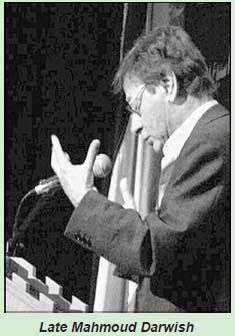Do not Write A
History Except that of Your Exile
By Tej Nath Dhar
April 2011
 Mahmoud
Darwish is one of the most notable Palestinian
poets and prose writers, who has published over
thirty volumes of poetry and eight books of prose.
Named after one of the sections in it, Journal of
an Ordinary Grief is the English translation of
one of his major prose works. Though it is based
on personal experience of the poet—about his
arrest, his interrogation, and his
imprisonment—it is also about the displacement
of Palestinians, their pain and suffering, and
their resistance against their oppression. Darwish
always equated himself and Palestine. Mahmoud
Darwish is one of the most notable Palestinian
poets and prose writers, who has published over
thirty volumes of poetry and eight books of prose.
Named after one of the sections in it, Journal of
an Ordinary Grief is the English translation of
one of his major prose works. Though it is based
on personal experience of the poet—about his
arrest, his interrogation, and his
imprisonment—it is also about the displacement
of Palestinians, their pain and suffering, and
their resistance against their oppression. Darwish
always equated himself and Palestine.
The different sections of the book read like
short meditations on the troubled existence of
Palestinians. The first one is in the form of
questions and answers, about a journey, in which
people who have been deprived of their homeland
traverse “the road of exile.” The ones who
died for it “died from the virus of love.”
Their “homeland surpasses Paradise: it is like
Paradise, but it is also attainable.” The
questions also relate to the attitude of usurpers,
who “commit the crime, deny it, and when the
victim confronts them they sidestep the question
by talking of peace.” The search for the
homeland is also for the lost heart, for “a
place is not only a geographical area; it’s also
a state of mind. And trees are not just trees;
they are the ribs of childhood.” The account
also punctures the falsehood spread by the
Israelis that the Arabs sold their land to them.
When the protagonist’s grandfather returned to
his place, he was charged with “stealing into
his own country.” Because people have been
rendered homeless, grief flows from the pores of
their skin and happiness comes only from the boots
of fighters.
Darwish also writes about memory and history
and the war of memories between the Israelis and
Arabs. The former use the memory of the holocaust
to justify their claim to the Arab land, but when
the latter ask for their homeland they are denied
their memory. They hardly realize that a homeland
is not just a map, but a place of ancestors. In
their state of homelessness, writing of history
for Palestinians takes a different direction:
“Do not write a history except that of your
wounds. Do not write a history except that of your
exile.” And the only way out for them is to
fight: “When you fight back you belong. And the
homeland is this struggle.”
The section on the ordinary grief reads like a
poem. It is about being a Palestinian, about arrests, trials, military
tribunals, and the travesty of justice. People are
made to realize “that philosophically you exist
but legally you do not.” You are arrested even
when you are “committing a dream” and because
victory eludes you “you feel no longer a
citizen. Your history is nothing more than dreams
that are torn to pieces like a newspaper, and each
dream is a disaster.”
Palestinian, about arrests, trials, military
tribunals, and the travesty of justice. People are
made to realize “that philosophically you exist
but legally you do not.” You are arrested even
when you are “committing a dream” and because
victory eludes you “you feel no longer a
citizen. Your history is nothing more than dreams
that are torn to pieces like a newspaper, and each
dream is a disaster.”
Another section provides details on the Kufr
Qasem Massacre which the Israelis justified by
their philosophy of “Either be a killer or be
the one killed.” It also reveals how the people
involved in it were either pardoned or found
guilty of a technical error and let off with a
rebuke and a fine of one Israeli piaster.
Darwish writes lyrically about the beauty of
his land, especially about Gaza. He also
elaborates on the dichotomies starkly visible in
the Israeli position, for it recognizes that
“the state has a right to kill its own people
and those belonging to other nations, but the
individual does not have a right to fight for the
sake of freedom.”
Darwish’s book is a must read for all those
who want to know the pain of exile, the suffering
of the Palestinians, and how and why the refugees
are transformed into bombs.
Journal of an Ordinary Grief by Mahmoud Darwish;
translated by Ibrahim Muhawi; New York:
Archipelago Books, 2010; pp xv + 177; price $ 16;
PB
*(The author is a prolific writer.
His publications include History-Fiction interface
in Indian English novel and under the shadow of
Militancy: The Diary of an unknown Kashmiri.)
Source: Kashmir
Sentinel
| 